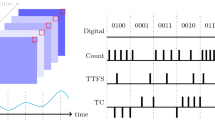Abstract.
Long battery life and high performance multimedia decoding are competing design goals for portable appliances. For a target level of QoS, the achievable battery life can be increased by dynamically adjusting the supply voltage throughout execution. In this paper, an efficient offline scheduling algorithm is proposed for preprocessing stored MPEG audio and video streams. It computes the order and voltage settings at which the appliance's CPU decodes the frames, reducing energy consumption without violating timing or buffering constraints. Our experimental results elucidate the trade-off between QoS and energy consumption. They demonstrate that the scheduler reduces CPU energy consumption by 19%, without any sacrifice of quality, and by nearly 50%, with only slightly reduced quality. The results also evaluate how the QoS/energy trade-off is affected by buffering and processor speed.
Similar content being viewed by others
Author information
Authors and Affiliations
Corresponding author
Rights and permissions
About this article
Cite this article
Mesarina, M., Turner, Y. Reduced energy decoding of MPEG streams. Multimedia Systems 9, 202–213 (2003). https://doi.org/10.1007/s00530-003-0090-7
Issue Date:
DOI: https://doi.org/10.1007/s00530-003-0090-7




